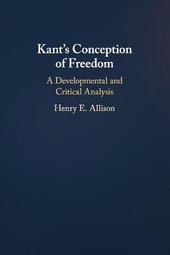
|
Kant's Conception of Freedom: A Developmental and Critical Analysis
Paperback / softback
Main Details
| Title |
Kant's Conception of Freedom: A Developmental and Critical Analysis
|
| Authors and Contributors |
By (author) Henry E. Allison
|
| Physical Properties |
| Format:Paperback / softback | | Pages:555 | | Dimensions(mm): Height 230,Width 150 |
|
| Category/Genre | Western philosophy - c 1600 to c 1900 |
|---|
| ISBN/Barcode |
9781316508466
|
| Classifications | Dewey:123.5 |
|---|
| Audience | | Professional & Vocational | |
|---|
|
Publishing Details |
| Publisher |
Cambridge University Press
|
| Imprint |
Cambridge University Press
|
| Publication Date |
20 May 2021 |
| Publication Country |
United Kingdom
|
Description
Although a good deal has been written about Kant's conception of free will in recent years, there has been no serious attempt to examine in detail the development of his views on the topic. This book endeavours to remedy the situation by tracing Kant's thoughts on free will from his earliest discussions of it in the 1750s through to his last accounts in the 1790s. This developmental approach is of interest for at least two reasons. First, it shows that the path that led Kant to view freedom as a transcendental power that is both radically distinct from and compatible with the causality of nature was a winding one. Second, it indicates that, despite the variety of views of free will that Kant held at various times, the concept occupied a central place in his thought, because it was the point of union between his theoretical and practical philosophy.
Author Biography
Henry Allison is Emeritus Professor of Philosophy at the University of California, San Diego. He is the author of nine books on Kant, including Kant's Theory of Freedom (Cambridge, 2003), Kant's Theory of Taste: A Reading of the Critique of Aesthetic Judgment (Cambridge, 2008), and Kant's Transcendental Deduction: An Analytical-Historical Commentary (2015).
Reviews'In terms of scholarship, organization, and clarity this book lives up to the standard Allison established in his previous books, and it is an invaluable resource for scholars of Kant or those interested in the concept of freedom.' S. E. Forschler, Choice
|